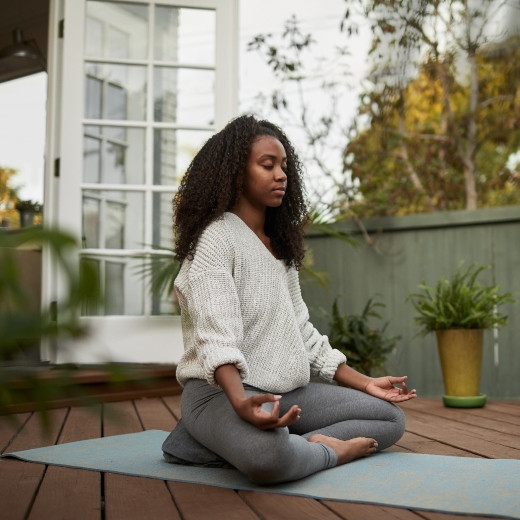Feeling Lonely? This is How Meditation May Help You
Jul 23rd 2021
There are various factors that affect the overall well-being of an individual. While most people focus on the physical aspect of health by being particular with the food they eat (even adding green vegetable supplements to their diet and regularly implementing pH balance test strips) and doing some fitness routine, many people are still suffering from distress.
Even before the pandemic happened, the importance of easing the pain of those experiencing loneliness has already been emphasized by the US President's Commission on Mental Health.1 Negative emotion has been long identified as one of the most common and chronic factors in depression2 – which may lead to serious health consequences.3
While technological advancements have made people more virtually connected, some studies have indicated that the use of social media may be tied to negative mental health outcomes,4 most especially during these challenging times. While this growing public health concern may seem alarming, know that there’s hope and that there are some evidence-based interventions that can help mitigate this concern – like meditation.5
Can Meditation Help with Loneliness?
Modern science has become more and more interested in finding possible solutions to address this concern with regards to the loneliness felt by many individuals. One of the things that they are looking into is meditation.
A study was conducted among retired South Asian older adults to find out the impact of meditation on their loneliness and in promoting wellbeing, life satisfaction, and contentment. Surprisingly, the implemented customized program became an effective tool in addressing their negative thoughts and feelings associated with the mental perception of loneliness.6
Similar studies have been conducted, this time with the introduction of guided mindfulness meditation exercises, yoga and stretching, and discussions that foster awareness. The results suggest a potential approach to solving this ongoing problem with regards to loneliness and provides a possible benefit to other diseases experienced by people in their late stages of life.
How Does Meditation Help with Loneliness?
The practice of meditation has been the subject of many researchers for decades now. The interaction between the brain, mind, body, and behavior has been supported to help reduce stress and promote health – by bringing out benefits to the physical, mental, and cognitive performance of an individual.7
People who have practiced meditation shared that such activity has provided them with a sense of calm, peace, and balance which play a big factor in their overall health. This is because meditation has helped them clear away the emotional build-up that they are feeling inside and identify their stress sources. Other benefits found in doing meditation include: increasing self-awareness, unleashing creativity and imagination, gaining new perspectives on how to deal with stressful situations, and learning how to be patient and tolerant with circumstances at hand.
How to Practice Meditation?
Several studios and meditation centers have been created to provide a venue for people to meditate. But if you can find a quiet location with little distractions at home and you have an open attitude that would suit meditation into your lifestyle, you are always free to adapt.
Some of the ways that you can incorporate meditation into your everyday dwelling include (1) mindful breathing, (2) creating your own mantra, (3) walking and meditating, (4) doing some reflections and prayers, and (5) focusing on love and gratitude. This can be better lived out when partnered with a healthy diet. Always make sure that you incorporate the recommended 5 – 9 servings of fruits and vegetables in your meal. But in case you find it difficult to source these out, you can opt for superfoods like pHresh Superblends™ and pHresh Greens® which can conveniently provide you with the raw greens that your body needs by simply mixing these with water, juice, or your favorite smoothie.
Learn more about superfoods and the other ways on how you can take better care of your bodyhere.
References:
1 Cacioppo S, Grippo AJ, London S, Goossens L, Cacioppo JT. Loneliness: clinical import and interventions. Perspect Psychol Sci. 2015 Mar;10(2):238-49. doi: 10.1177/1745691615570616. PMID: 25866548; PMCID: PMC4391342.
2 Erzen E, Çikrikci Ö. The effect of loneliness on depression: A meta-analysis. Int J Soc Psychiatry. 2018 Aug;64(5):427-435. doi: 10.1177/0020764018776349. Epub 2018 May 23. PMID: 29792097.
3 Freedman A, Nicolle J. Social isolation and loneliness: the new geriatric giants: Approach for primary care. Can Fam Physician. 2020 Mar;66(3):176-182. PMID: 32165464.
4 Berryman C, Ferguson CJ, Negy C. Social Media Use and Mental Health among Young Adults. Psychiatr Q. 2018 Jun;89(2):307-314. doi: 10.1007/s11126-017-9535-6. PMID: 29090428.
5 Emily K. Lindsay, Shinzen Young, Kirk Warren Brown, Joshua M. Smyth, and J. David Creswell. Mindfulness training reduces loneliness and increases social contact in a randomized controlled trial. February 26, 2019 116 (9) 3488-3493; first published February 11, 2019;https://doi.org/10.1073/pnas.1813588116
6 Pandya SP. Meditation program mitigates loneliness and promotes wellbeing, life satisfaction and contentment among retired older adults: a two-year follow-up study in four South Asian cities. Aging Ment Health. 2021 Feb;25(2):286-298. doi: 10.1080/13607863.2019.1691143. Epub 2019 Nov 22. PMID: 31755300.
7 Tang YY, Hölzel BK, Posner MI. The neuroscience of mindfulness meditation. Nat Rev Neurosci. 2015 Apr;16(4):213-25. doi: 10.1038/nrn3916. Epub 2015 Mar 18. PMID: 25783612.


